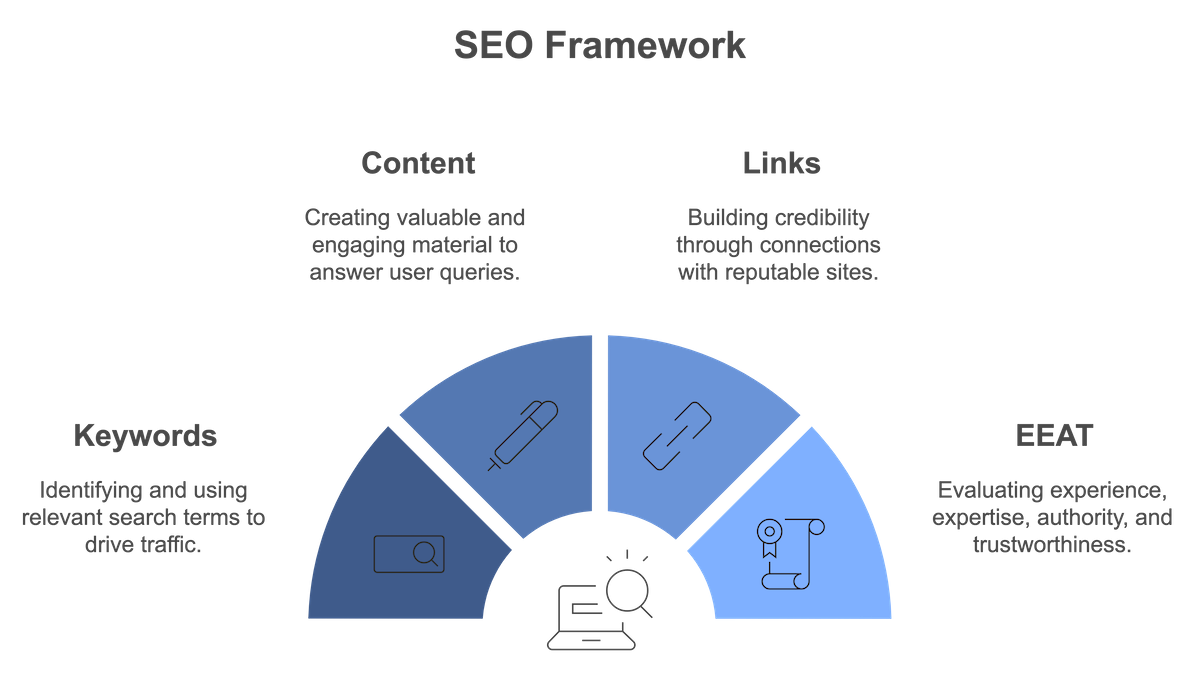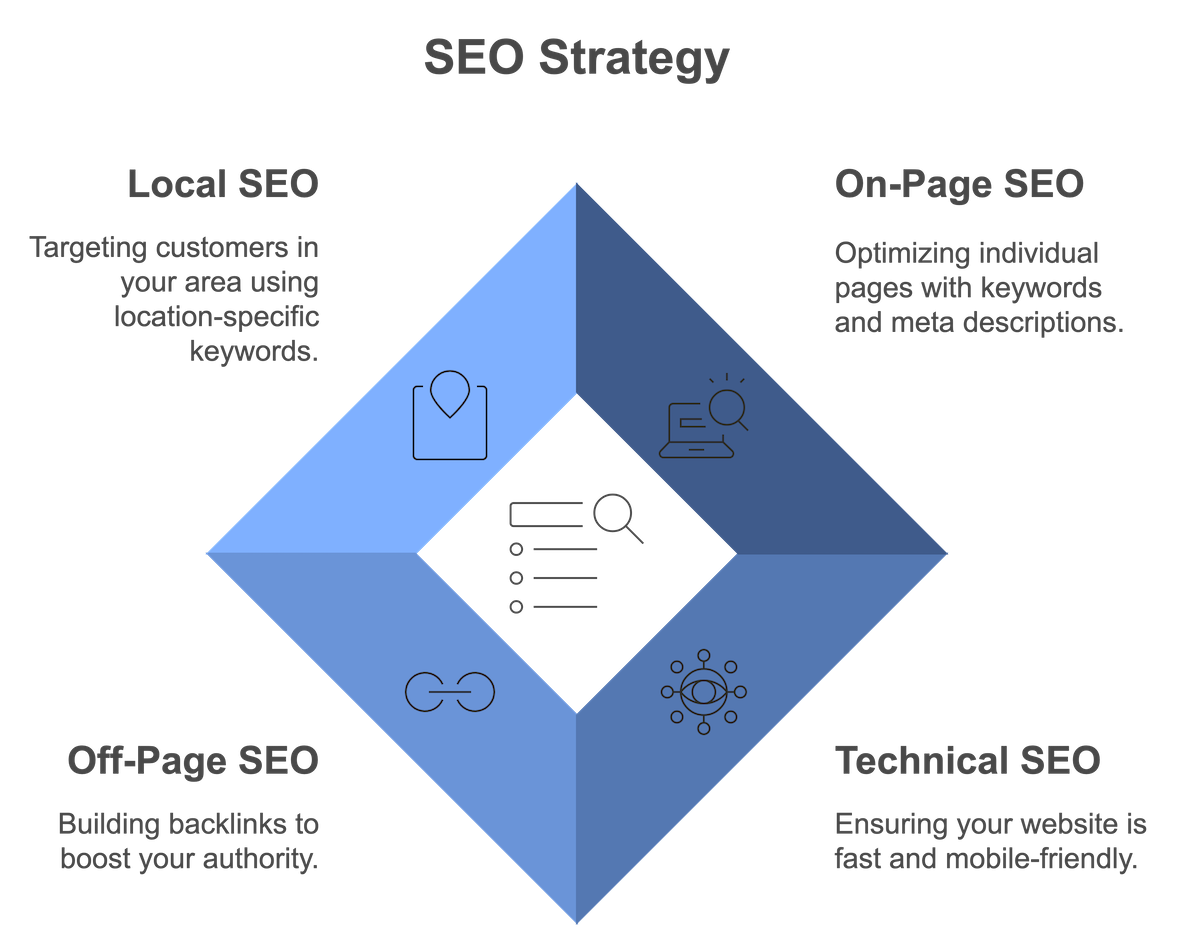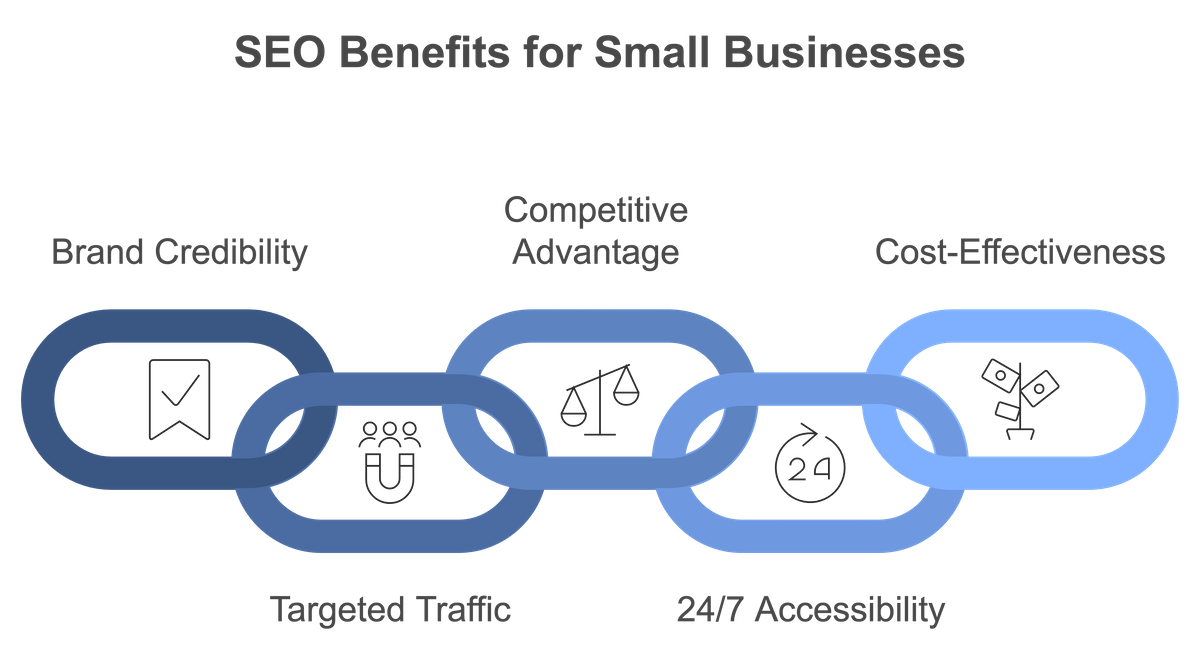SEO for Small Business: The Ultimate Guide to Getting Found Online
By: Hayden Jarman

SEO, or search engine optimization, often feels like a mystery for small business owners.
Questions like, "How do I compete with larger companies?" and "Is it even worth it?" are common.
The good news: SEO levels the playing field.
By optimizing your website and content, you can improve your visibility and reach the right audience---without breaking the bank.
Table of Contents:
- What Is Small Business SEO?
- How Does SEO Work?
- Benefits of SEO for Small Businesses
- How to Get Started with SEO for Small Businesses
- Top SEO Strategies for Small Businesses
- Advanced Tips for Small Business SEO
- Examples of Effective SEO Strategies
- FAQ Section
- Final Thoughts
🧐 SEO Readiness Check: Is Your Business SEO-Optimized? 🚀
Answer these quick questions to see how SEO-ready your business is and get personalized tips!
What Is Small Business SEO?
Small business SEO focuses on increasing visibility for smaller, often local businesses. It ensures you're found by customers who are already looking for the services you offer.
Definition and Importance of Small Business SEO
SEO for small businesses ensures you show up when potential customers search online. Unlike traditional ads, SEO helps you rank higher organically, providing long-term benefits.
Small Business SEO vs. Local SEO: Key Differences
| Small Business SEO | Local SEO |
|---|---|
| Focuses on broader keywords | Targets location-based searches |
| Uses tools like SEMrush | Relies on Google Business Profile |
| Competitors can include big brands | Focus is on nearby competitors |
SEO vs. Paid Search: Which Should You Focus On?
SEO is a long-term investment that brings sustainable traffic, while paid search can deliver immediate results. The best strategy? Use both, but focus on SEO for ongoing growth.
How Does SEO Work?
Google's algorithm evaluates your site based on relevance, authority, and trustworthiness. By aligning your website with these criteria, you can improve your rankings.
The Fundamentals of Search Engine Optimization
Effective SEO focuses on three main components:
- Keywords: Research terms your audience is searching for.
- Content: Create valuable, engaging pages that answer user questions.
- Links: Build credibility with backlinks from reputable sites.
The Role of Keywords, Content, and Links in Ranking
Each of these elements plays a critical role:
- Keywords: Identify long-tail terms that are less competitive but highly relevant.
- Content: Optimize titles, meta descriptions, and body text for readability and SEO.
- Links: Internal and external links signal authority and relevance.
What Is EEAT (Experience, Expertise, Authority, Trust)?
EEAT is a framework Google uses to assess your website. The more trustworthy and knowledgeable your site appears, the higher it will rank.

Benefits of SEO for Small Businesses
Investing in SEO provides measurable results, from increased traffic to better ROI.
Boosting Brand Awareness and Credibility
Higher rankings make your business appear more credible. 76% of users trust search engines for recommendations, making SEO vital for building authority.
Driving Targeted Website Traffic
Organic search isn't just about volume---it's about quality. 68.7% of all clicks go to the top three results, proving the value of ranking well.
Establishing a Competitive Advantage
SEO helps you compete with larger companies by targeting niche keywords and leveraging local strategies.
Increasing Accessibility with a 24/7 Online Presence
Your website is your hardest-working salesperson, available round-the-clock. Optimizing it ensures customers can find you anytime.
Why SEO is the Most Cost-Effective Marketing Strategy
SEO requires upfront effort but delivers ongoing results. Compare that to paid ads, which stop working the second you stop paying.
How to Get Started with SEO for Small Businesses
Setting Up Essential Tools: Google Analytics & Search Console
These tools are essential for tracking performance:
- Google Analytics: Monitors traffic and user behavior.
- Google Search Console: Identifies errors and tracks keyword rankings.
Understanding SEO Costs: DIY vs. Hiring a Professional
Small businesses typically spend $500 per month on SEO. Whether you DIY or hire an expert depends on your goals and time.
How to Choose the Right SEO Service Provider
- Provides clear deliverables.
- Has proven results.
- Specializes in small business SEO.

Top SEO Strategies for Small Businesses
Identifying and Targeting Long-Tail Keywords
Long-tail keywords attract specific, ready-to-convert users. For example, "affordable family dentist in Wilmington" is easier to rank for than "dentist."
Crafting Human-Centric, SEO-Optimized Content
Write for people first, but ensure search engines understand your content. Use clear headings, bullet points, and concise paragraphs.
Enhancing On-Page SEO: Titles, Meta Descriptions, and URLs
Optimize these elements for your primary keywords.
Mobile Optimization: Why It's Non-Negotiable
With 90% of global users browsing on mobile devices, mobile-friendly sites are essential.
Improving Site Speed for Better Rankings
Fast-loading pages provide a better user experience and improve rankings. Use tools like PageSpeed Insights to monitor performance.
Building Authority with Backlinks
Links from reputable sites boost your domain authority. Partner with local blogs or organizations for natural backlinks.
Maximizing Local Search Visibility: Google Business Profile Tips
Complete your profile with accurate information and high-quality photos.
Leveraging Social Media to Support SEO Efforts
While not a direct ranking factor, social signals improve brand visibility and traffic.
Advanced Tips for Small Business SEO
Writing for Humans First, Search Engines Second
Algorithms reward engaging, user-focused content. Forget keyword stuffing---focus on value.
Staying Updated with Emerging SEO Trends in 2024
AI, voice search, and Core Web Vitals are just a few trends shaping SEO. Stay informed to remain competitive.
Tracking and Analyzing SEO Performance Metrics
Monitor KPIs like traffic, bounce rate, and conversions to gauge your progress.
Managing Online Reviews and Feedback Strategically
Positive reviews build trust, while addressing negative ones shows you care about customers.

Examples of Effective SEO Strategies
Common Mistakes Small Businesses Make in SEO (And How to Avoid Them)
Avoid errors like ignoring mobile users or neglecting local keywords.
| Factor | SEO | Paid Search |
|---|---|---|
| Cost | Long-term investment | Immediate expense |
| Results | Sustainable | Short-term |
| Traffic | Organic, trust-building | Targeted, but fleeting |
FAQ Section
How Long Does SEO Take to Show Results?
Typically, 3--6 months for noticeable changes, depending on your competition.
Is SEO Worth It for Small Businesses?
Absolutely. It's the most cost-effective way to attract and retain customers.
What Are the Best Tools for Small Business SEO?
- Google Analytics
- Google Search Console
- SEMrush
How Can I Optimize for Voice Search?
Focus on conversational keywords and concise answers.
Final Thoughts
SEO isn't just for big businesses. With the right strategy, small businesses can compete and thrive in search rankings.
Take action today---optimize your website, engage your audience, and watch your business grow.
Free SEO Consultation: Let Us Help Your Business Grow
Related Posts:
- Understanding Google’s Local Pack: How to Get Featured
- Google Business Profile FAQs: Everything You Need to Know
- The Best Google Ads Extensions to Boost Your Click-Through Rates
- How to Leverage Facebook Groups for Local Business Leads
- How to Use AI to Write Better Social Media Captions
- How to Optimize Google Reviews to Attract More Customers
- LinkedIn for B2B Marketing Success
- How to Conduct a Social Media Audit (w/ "Audit Readiness" Quiz!)
- Creating a Content Calendar for Consistent Posting
- The Importance of Mobile Optimization in 2024
- Data Privacy Regulations: What Marketers Need to Know
- The Role of Chatbots in Enhancing Customer Service
- SEO for Small Business: The Ultimate Guide to Getting Found Online
- The Role of Keyword Clustering in Modern SEO



